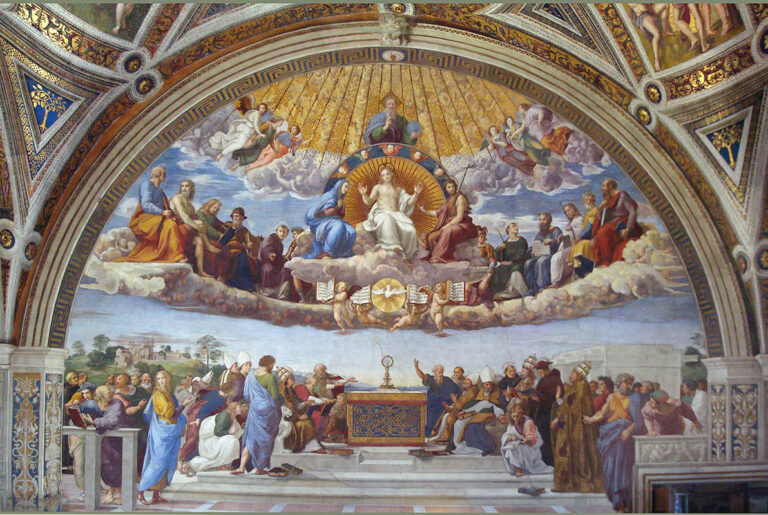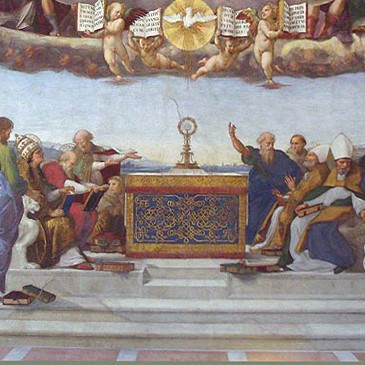3 July 2024
The Popes & the Arts
By Joey Belleza, PhD (Cantab.)
One of the hallmarks of Christianity, rooted in the Incarnate Christ who entered into material existence, is its positive approach to the arts, recognizing that the Gospel can reach souls not only through the activity of preachers, but also through the works of painters, sculptors, architects, poets, and writers. There is no type of human expression which cannot become a vehicle for apostolic activity, and the Church–especially through the Roman Pontiffs–has happily extended her patronage to many of the greatest artists in history. Indeed, in every place where the Catholic faith has found a foothold, the arts have discovered new opportunities to express the harmony between the timeless Gospel of our Lord, on one hand, and the genius of local cultures, on the other hand.
Accordingly, nearly all recent popes have explicitly affirmed the necessity of the arts for the Church’s mission. Below are just a few examples from papal messages to the artistic community.
In order to communicate the message entrusted to her by Christ, the Church needs art. Art must make perceptible, and as far as possible attractive, the world of the spirit, of the invisible, of God. It must therefore translate into meaningful terms that which is in itself ineffable. Art has a unique capacity to take one or other facet of the message and translate it into colours, shapes and sounds which nourish the intuition of those who look or listen. It does so without emptying the message itself of its transcendent value and its aura of mystery….
It remains true that because of its central doctrine of the Incarnation of the Word of God, Christianity offers artists a horizon especially rich in inspiration. What an impoverishment it would be for art to abandon the inexhaustible mine of the Gospel!
Saint John Paul II, Letter to Artists, 4 April 1999
Ten years later, John Paul’s successor likewise exhorted artists to their highest vocation of manifesting the beauty which comes from God.
Beauty, whether that of the natural universe or that expressed in art, precisely because it opens up and broadens the horizons of human awareness, pointing us beyond ourselves, bringing us face to face with the abyss of Infinity, can become a path towards the transcendent, towards the ultimate Mystery, towards God. Art, in all its forms, at the point where it encounters the great questions of our existence, the fundamental themes that give life its meaning, can take on a religious quality, thereby turning into a path of profound inner reflection and spirituality.
Pope Benedict XVI, Meeting with Artists, 21 November 2009
Finally, in our own time, Pope Francis has reaffirmed the necessity of good art marked by a harmony between God and creation.
Beauty makes us sense that life is directed towards fullness, fulfilment. In true beauty, we begin to experience the desire for God. Many today hope that art can return more and more to the cultivation of beauty. Certainly, as I have said, there is also a kind of beauty that is futile, artificial, superficial, even dishonest. Cosmetic beauty.
I believe that there is an important criterion for discerning the difference, and that is harmony. True beauty is in fact a reflection of harmony. Theologians speak of God’s fatherhood and Christ’s sonship, but when they speak of the Holy Spirit they speak of harmony: Ipse harmonia est. The Spirit creates harmony. The human dimension of the spiritual… True beauty is always the reflection of harmony. If I may say so, harmony is the operative virtue of beauty, its deepest spirit, where the Spirit of God, the great harmonizer of the world, is at work.
Pope Francis, Address to Artists, 23 June 2023
These popes all affirm that art’s power to captivate and express creativity must be ordered to that invisible, transcendent Beauty which is God himself. Thus, there must be some properly theological criteria for creative endeavours, if they are to be truly considered art. Pope Francis’s words on the necessity of harmony especially indicate the need for creative contours and even limits, if art should not simply a product of independent self-expression. Rather, rooted in the mystery of the Incarnation and in the sacramentality of creation, the goodness of art depends on its correspondence with right reason, that is, reason ordered toward the truths of divinely revealed faith.
The Christian Heritage Centre is proud to encourage the deepening of faith through the appreciation and practice of Christian art. Our yearly Ancient Byzantine Iconography Course is one example of our commitment to the union of faith and reason as expressed in traditional artistic forms.
In that light, we are also proud to offer an upcoming intensive study weekend on art, faith, and Catholic culture. Entitled “What We Have Seen And Heard in Heaven” and running 13-15 September 2024, this retreat examines art and Christian creativity through its various expression in music, dance, visual art, and poetry. To learn more and to register for this retreat, visit our event webpage by clicking here.


